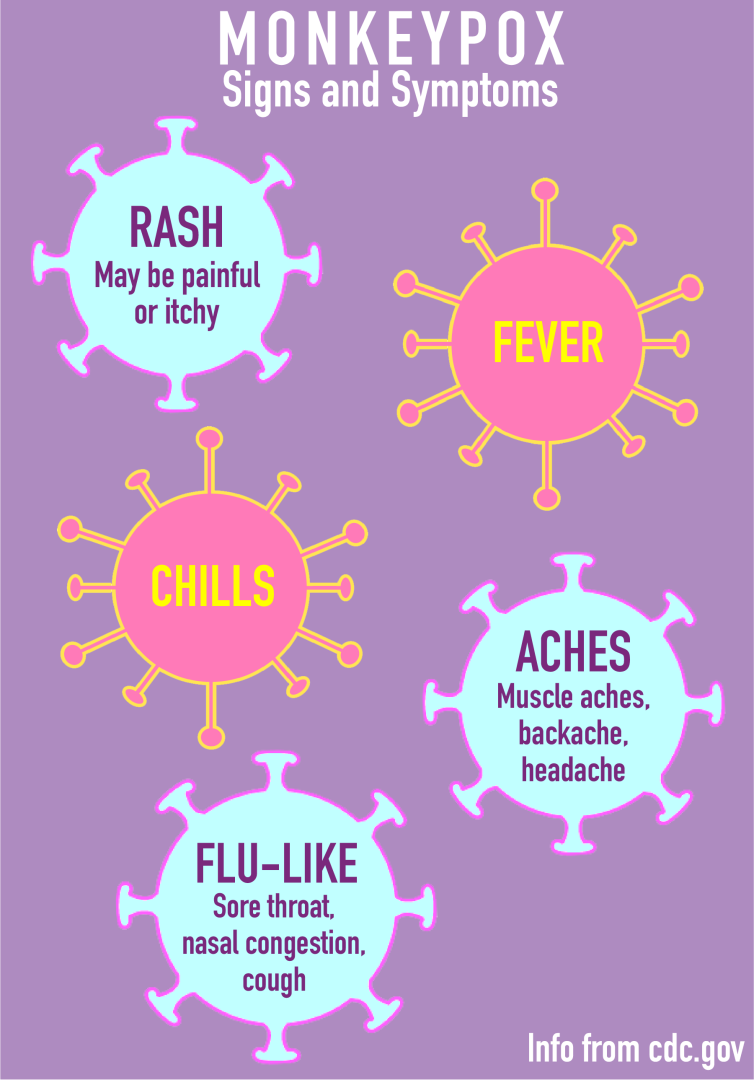An outbreak of the monkeypox virus is occurring in the United States and multiple other countries, where it was previously unreported. The virus was officially declared a public health emergency by the U.S. Department of Health and Human Services on Aug. 4, 2022, according to the Centers for Disease Control and Prevention (CDC). As of The Reflector print time, there are 102 reported cases of monkeypox in Indiana, as shown by the CDC’s 2022 U.S. Map and Case Count.
Assistant Professor of Public Health Education and Promotion in Kinesiology Kara Cecil said that while the disease is not new to the world, as it is endemic in some African countries, it is new to the U.S.
The disease was first isolated in monkeys, but is transmitted by rodents to humans, making it zoonotic, according to Cecil. She said monkeypox is transmitted from person to person mostly through contact with skin lesions, bodily fluids or respiratory droplets. However, it can exist outside of a human host on linens or clothing.
“The more people you have close, personal contact with, the greater risk you have of contracting monkeypox, and just really any other infectious disease,” Cecil said.
Cecil said that the early signs of monkeypox can mirror the symptoms of other health conditions. Early symptoms evolve from general fatigue to flu-like symptoms, such as fever and muscle aches.

“At that point, your lymphatic system, your lymph nodes, will start to become swollen. And then finally you can see a breakout of blisters or a blister-like rash on the skin; it depends on how it was transmitted and where the rash first appears,” Cecil said. “After a week or two, the rash, the pustules, will dry up and you will continue to recover. And most of the time it’s self-limiting. It’s a self-limiting condition, which means it resolves. It most often resolves on its own…. You don’t have to go get treated for it, necessarily.”
While men who have intercourse with other men and those living with HIV make up the majority of cases in the current outbreak, according to the CDC, anyone who has been in close contact with an infected person is at risk. If someone believes that they are seeing the early symptoms of monkeypox, they should evaluate their risk factors, Cecil said.
“I would say anyone, any person, student or otherwise… if you have that close personal intimate contact with multiple unique people, so not repeat, but multiple unique people, you have a greater risk of contracting monkeypox and any number of other diseases from pinkeye or a common cold, to monkeypox or syphilis or HIV,” Cecil said.
Symptoms should be considered in the context of daily health behaviors, like going to the gym being the cause of muscle soreness, Cecil said. However, a rash should be seen by a healthcare professional.
“If you see a rash, particularly in the genital area, that you want to have examined by a healthcare professional because it could be monkeypox, could be syphilis; it could be a lot of other things,” Cecil said.
The CDC recommends that those who have been exposed to monkeypox, and those that are at a high risk for exposure, get vaccinated against the virus. Due to a limited supply of vaccines, an individual must see a healthcare provider to determine their eligibility, according to Cecil.
Monkeypox is less transmissible than other diseases, like COVID-19, and therefore, Cecil does not expect to see massive worldwide issues. Additionally, most cases in adults are not severe. Labeling the disease a public health emergency allowed access to funding that pays for producing more vaccines and the distribution process, which is needed because the outbreak was not anticipated, she said.
A statement from the White House on Aug. 18 announced that the Department of Health and Human Services will have 1.8 million doses of monkeypox vaccine available starting on Aug. 22.
Students can protect themselves from monkeypox with simple measures, such as hand washing and staying home when ill, Cecil said. It is a good idea to avoid contact with anyone exhibiting signs of illness, she said.
“There are some basic things that you can do to prevent and protect yourself against all kinds of infectious disease: hand hygiene, staying home if you feel sick, keeping your hands off your face, washing your hands before you eat, keeping your environment clean, just kind of clean and tidy, doing your laundry, keeping things picked up,” Cecil said. “And you can really limit your exposure, particularly to this disease, by limiting your number of intimate partners.”
For more monkeypox information and resources, visit cdc.gov or damien.org for those in the Indianapolis area.






